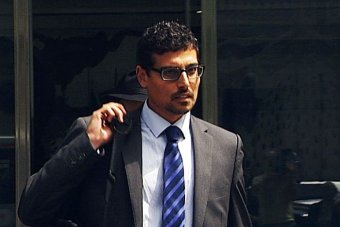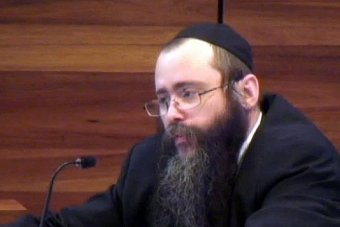Child abuse royal commission: Rabbi inaction failed abuse victims within Yeshiva community
ABC
Sarah Farnsworth
29 November 2016
 The commission found abuse victims at Yeshiva were let down by inaction. (ABC News)
The commission found abuse victims at Yeshiva were let down by inaction. (ABC News)
The royal commission has delivered its findings into child abuse at Jewish institutions in Melbourne and Sydney, saying that abuse victims were let down by rabbis and their "confused" adherence to the Jewish law Mesirah, leaving them vulnerable to paedophiles.
The commission found many of the lead rabbis at Yeshiva Melbourne and Yeshiva Bondi, as well as synagogues and schools in Sydney and Melbourne followed "a pattern of total inaction" that was wholly inadequate.
The Royal Commission into Institutional Responses to Child Sexual Abuse's findings vindicate whistle blower Manny Waks, who first exposed abuse within the strictly orthodox and insular sect.
Three commissioners found a "marked absence of supportive leadership for survivors of abuse" and the incorrect application of Jewish law left those who spoke out criticised and isolated.
Mesirah is the religious concept stopping a Jewish person informing upon another to a secular authority. To do so would make them a "Moser".
The commission found many of the lead rabbis at Yeshiva Melbourne and Yeshiva Bondi, as well as synagogues and schools in Sydney and Melbourne followed "a pattern of total inaction" that was wholly inadequate.
The Royal Commission into Institutional Responses to Child Sexual Abuse's findings vindicate whistle blower Manny Waks, who first exposed abuse within the strictly orthodox and insular sect.
Three commissioners found a "marked absence of supportive leadership for survivors of abuse" and the incorrect application of Jewish law left those who spoke out criticised and isolated.
Mesirah is the religious concept stopping a Jewish person informing upon another to a secular authority. To do so would make them a "Moser".
 Manny Waks first exposed abuse within the strictly orthodox sect.
Manny Waks first exposed abuse within the strictly orthodox sect.
Mixed messages produced inaction
Those who spoke out where strongly criticised and confusion reigned about whether reporting abuse to police was forbidden, the report found.
"If anything, the mixed messages were likely to have produced inaction," the report said.
Four victims of sexual abuse, along with leading rabbis within the Chabad movement, gave evidence about child abuse in Yeshiva Colleges and centres in Melbourne and Bondi last year.
Convicted paedophiles David Cyprys, Rabbi David Kramer and Daniel Hayman were all the subjects of allegations of abuse by parents and students between 1984 and 2000.
"It is perhaps unsurprising that a community described in the evidence as being insular, would be concerned by communication with those external to the community about child sexual abuse reportedly perpetrated by Jews," the report said.
"We are satisfied that, for the period from 1984 to 2007, the Yeshiva College Melbourne did not have adequate policies, processes and practices for responding to complaints."
Those who spoke out where strongly criticised and confusion reigned about whether reporting abuse to police was forbidden, the report found.
"If anything, the mixed messages were likely to have produced inaction," the report said.
Four victims of sexual abuse, along with leading rabbis within the Chabad movement, gave evidence about child abuse in Yeshiva Colleges and centres in Melbourne and Bondi last year.
Convicted paedophiles David Cyprys, Rabbi David Kramer and Daniel Hayman were all the subjects of allegations of abuse by parents and students between 1984 and 2000.
"It is perhaps unsurprising that a community described in the evidence as being insular, would be concerned by communication with those external to the community about child sexual abuse reportedly perpetrated by Jews," the report said.
"We are satisfied that, for the period from 1984 to 2007, the Yeshiva College Melbourne did not have adequate policies, processes and practices for responding to complaints."
 The commission was critical of Rabbi Feldman's ignorance of child abuse. (ABC News)
The commission was critical of Rabbi Feldman's ignorance of child abuse. (ABC News)
Child abuse 'uncommon'
Senior Sydney rabbi Yosef Feldman provoked controversy when he told the royal commission he would be "asking for more leniency" for reformed or inactive paedophiles
In its findings, the commission was critical of his ignorance about what constituted child abuse.
"Rabbi Feldman freely admitted to a lack of technical knowledge about child sexual abuse but expressed the belief that his ignorance was unimportant," the report said.
He told the commission he believed child abuse to be "uncommon".
"He did not hear of child sexual abuse or complaints of child sexual abuse 'much' and believed that 'only' 5 to 10 per cent of the community 'are involved' in child sexual abuse," the report said.
Rabbi Feldman misunderstood what grooming was, describing it as "just talking to the child and trying to get close to him", the commission found.
He also regarded the age of a victim to be important when assessing any allegation.
"The older you get, the less innocent you become and there could be a possibility," he told the hearings.
"I could imagine that there could be false accusations with regards to teenagers, who are not so innocent."
The commission found Rabbi Feldman believed that the conviction of a child abuser who was repentant would be unfair.
Following Rabbi Feldman's evidence, the NSW Jewish Board of Deputies labelled his views repugnant and declared him to be "unfit to hold any position of authority or leadership in the Jewish community".
He resigned from the board of management of the Yeshiva Centre in Sydney in February 2015.
Originally published at ABC.
Senior Sydney rabbi Yosef Feldman provoked controversy when he told the royal commission he would be "asking for more leniency" for reformed or inactive paedophiles
In its findings, the commission was critical of his ignorance about what constituted child abuse.
"Rabbi Feldman freely admitted to a lack of technical knowledge about child sexual abuse but expressed the belief that his ignorance was unimportant," the report said.
He told the commission he believed child abuse to be "uncommon".
"He did not hear of child sexual abuse or complaints of child sexual abuse 'much' and believed that 'only' 5 to 10 per cent of the community 'are involved' in child sexual abuse," the report said.
Rabbi Feldman misunderstood what grooming was, describing it as "just talking to the child and trying to get close to him", the commission found.
He also regarded the age of a victim to be important when assessing any allegation.
"The older you get, the less innocent you become and there could be a possibility," he told the hearings.
"I could imagine that there could be false accusations with regards to teenagers, who are not so innocent."
The commission found Rabbi Feldman believed that the conviction of a child abuser who was repentant would be unfair.
Following Rabbi Feldman's evidence, the NSW Jewish Board of Deputies labelled his views repugnant and declared him to be "unfit to hold any position of authority or leadership in the Jewish community".
He resigned from the board of management of the Yeshiva Centre in Sydney in February 2015.
Originally published at ABC.